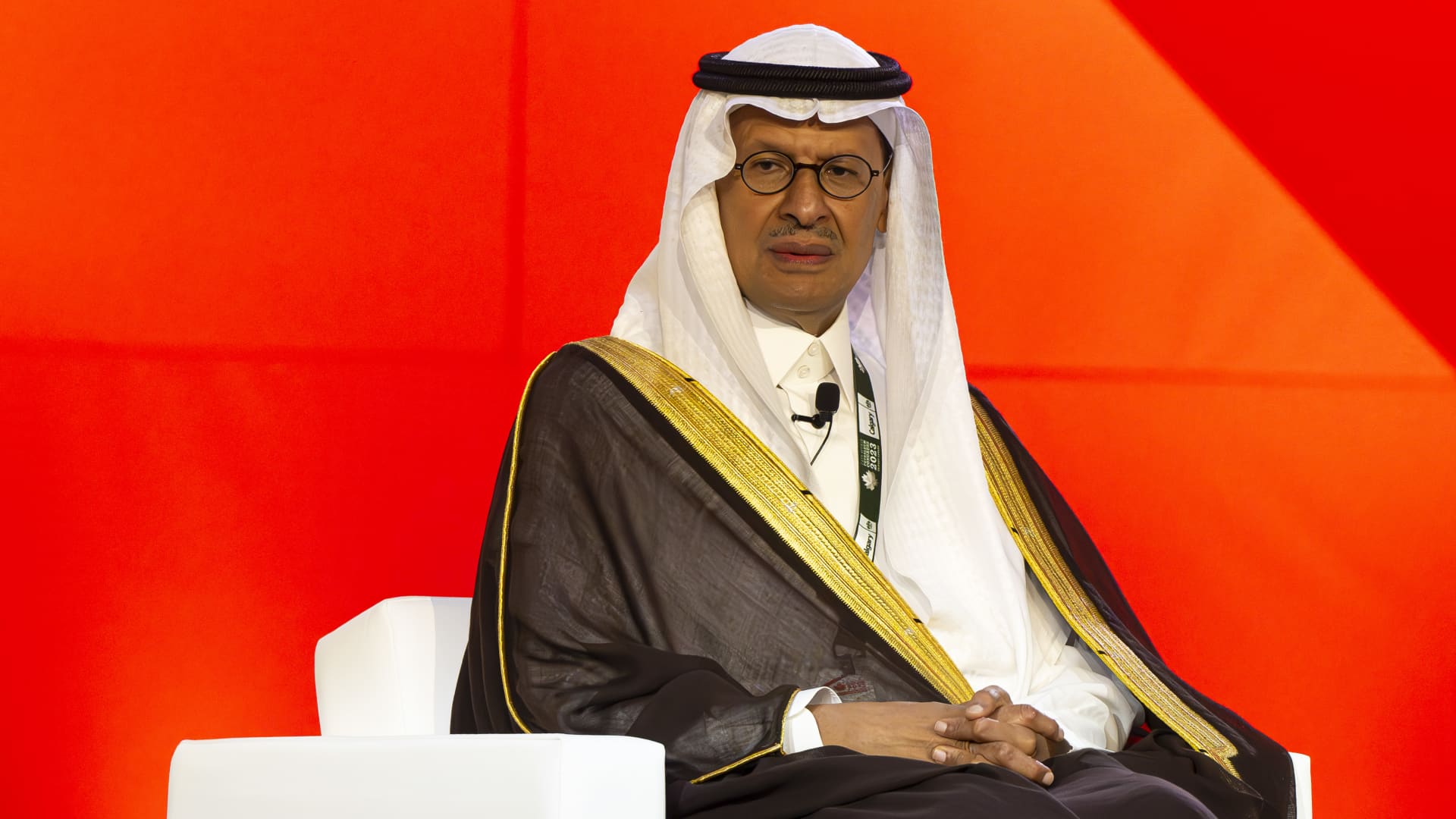Saudi Arabia’s energy minister said Riyadh and Moscow’s decision to extend crude oil supply cuts is not about “jacking up prices,” as Brent futures hover near $95 a barrel and analysts predict further rises into triple digits.
“We can reduce more, or we can increase, that has been a subject that we want to make sure that the messaging is clear, that it’s not about, again, this jacking up prices,” Saudi Energy Minister Prince Abdulaziz bin Salman said Monday at the World Petroleum Congress in Calgary.
“It’s about … making the decision at the right time, when we have the data, and when we have the clarity that would make us in much more of a comfort zone to take that decision.”
Some members of the Organization of the Petroleum Exporting Countries and its allies, known as OPEC+, are implementing 1.66 million barrels per day of combined voluntary declines — which falls outside of unanimously agreed OPEC+ policies — until the end of 2024. Topping this, Saudi Arabia and Russia announced they will apply respective voluntary declines of 1 million barrels per day of production and 300,000 barrels per day of exports until the end of the year.
Saudi Arabia is the world’s largest seaborne oil exporter and relies on hydrocarbon revenues to support so-called giga-projects designed to diversify its economy.
Shrugging off the inertia of the first half of the year, oil prices have gained ground amid supply cut announcements in recent months, as the market braces for a potential volume deficit in the latter part of 2023. Ice Brent crude futures with November delivery were trading at $95.00 per barrel at 9:19 a.m. London time Tuesday, up 57 cents per barrel from the Monday close price. Front-month October Nymex WTI futures were at $92.65 per barrel, up $1.17 per barrel from the Monday settlement. The increases have rallied some analysts around speculation of a short-term return to oil prices at $100 per barrel.
Asked on the possibility of hitting that threshold, Chevron CEO Mike Wirth on Monday admitted oil prices could cross into triple digits in a Bloomberg TV interview.
“Sure looks like it. We’re certainly moving in that direction. The momentum, you know, supply is tightening, inventories are drawing, these things happen, gradually you can see it building. And so I think, you know, the trends would suggest we’re certainly on our way, we’re getting close,” he said, acknowledging an impact on the world economy. “I think the underlying drivers to the economy in the U.S. and frankly globally remain pretty healthy. I think it’s a drag on the economy, but one that thus far, I think the economy has been able to tolerate.”
Energy prices have repeatedly underpinned higher inflation in the months since the war in Ukraine and Europe’s gradual loss of access to sanctioned Russian seaborne oil supplies.
Peak feud
Abdulaziz once more struck out at Paris-based watchdog the International Energy Agency, whose Executive Director Fatih Birol last week said in a Financial Times op-ed that “the IEA was wary of such premature calls, but our latest projections show that the growth of electric vehicles around the world, especially in China, means oil demand is on course to peak before 2030.”
“None of the things that they were warning about has happened. And name me any time that their forecasts were as accurate as one would have hoped for. But, you know, they’ve moved now from being forecasters and assessors of market to one of political advocacy,” Abdulaziz said Monday.
The IEA did not immediately respond to a CNBC request for comment.
Amin Nasser, CEO of Saudi state-controlled oil giant Aramco, likewise on Monday said that the notion of peak oil demand is “wilting under scrutiny,” noting “many shortcomings in the current transition approach that can no longer be ignored” and stressing that carbon capture “can no longer be the bridesmaid of transition.”
The comments come two months ahead of a pivotal session of the United Nations climate change conference, which is set to controversially convene on the territory of major oil producer the United Arab Emirates, starting on Nov. 30.
Climate change positioning has been a key hurdle of the increasingly fraught relationship between Saudi Arabia and the IEA — in a landmark 2021 report, the energy watchdog argued for no investment in new fossil fuel supply projects, if the world is to stave off an incoming climate crisis. Riyadh meanwhile champions a dual approach to decarbonization with simultaneous investment in oil and gas and renewables, in a bid to avoid an energy deficit.
U.S. stance
Higher prices at the pump have historically put pressure on the administration of U.S. President Joe Biden, which in October last year waged an intense war of words over the OPEC+ production strategy that levied accusations of coercion against Riyadh.
But Washington has stayed comparatively silent over the latest OPEC+ reductions, even as Biden mounts his campaign for re-election next year. The U.S. must balance domestic interests against foreign policy objectives to normalize relations between Israel and Saudi Arabia, while Riyadh has increasingly slipped Washington’s influence after resuming ties with Iran in China-brokered diplomacy earlier this year and earning an invitation to the China and Russia-backed emerging economies group BRICS in August.
In a further blow to the U.S., Saudi Arabia remains tightly bound to Western-sanctioned OPEC+ heavyweight producer Russia. Most recently, the Kremlin said Russian President Vladimir Putin and Saudi Arabia’s Crown Prince Mohammed bin Salman spoke by phone on Sept. 6 and “noted that specific agreements on reducing oil production, combined with voluntary obligations to limit raw materials deliveries, made it possible to stabilize the global energy market.”
